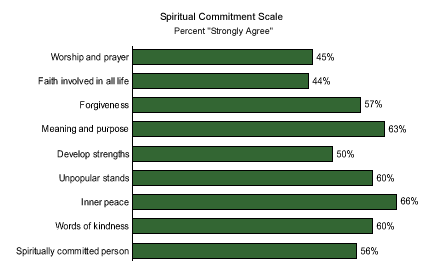One of the key pillars of the spiritual health of any congregation is the level of spiritual commitment among its members. Spiritual commitment reflects a personal depth of faith and is manifested in both attitudes and behaviors. George Â鶹´«Ã½ Jr., first began studying spiritual commitment several years ago and published his findings in his 1992 book, The Saints Among Us.
Using the discoveries in The Saints Among Us as a jumping off point, The Â鶹´«Ã½ Organization recently researched the spiritual commitment level of members of American faith communities of all types -- Christian, Jewish, Muslim, Hindu, etc. As a result of this research, Â鶹´«Ã½ identified nine items that best measure individual spiritual commitment. These items include four attitudes and five behaviors:
Spiritually Committed Attitudes
- My faith is involved in every aspect of my life.
- Because of my faith, I have meaning and purpose in my life.
- My faith gives me an inner peace.
- I am a person who is spiritually committed.
Spiritually Committed Behaviors
- I spend time in worship or prayer every day.
- Because of my faith, I have forgiven people who have hurt me deeply.
- My faith has called me to develop my given strengths.
- I will take unpopular stands to defend my faith.
- I speak words of kindness to those in need of encouragement.
Copyright © 2001 The Â鶹´«Ã½ Organization, Princeton, NJ. All rights reserved.
In a 2001 survey of U.S. adults who are members of faith communities*, Â鶹´«Ã½ asked respondents to rate each of the above nine items on a scale of 1 to 5, with 1 being "strongly disagree" and 5 being "strongly agree." The chart below indicates the percentage of "5" (strongly agree) responses to each of the nine items. Interestingly, 66% of respondents strongly agreed that their faith gave them an inner peace (the highest-ranking response), while only 44% strongly agreed that their faith was involved in every aspect of their lives (the lowest-ranking response).

Beginning next week, I will consider each of the nine items of spiritual commitment -- with an eye toward the role that item plays in the life of the congregation and how religious leaders can use an understanding of each to improve the congregation's dynamics.
*Results are based on telephone interviews with 729 adult members of a church, synagogue, or other religious faith community, aged 18 and older, conducted October through November 2001. For results based on this sample, one can say with 95% confidence that the margin of sampling error is ±3.6%.
